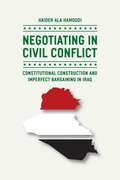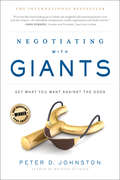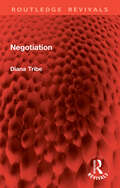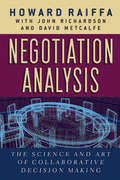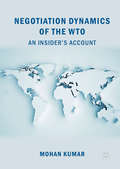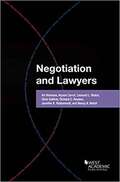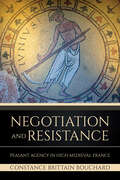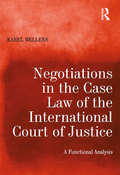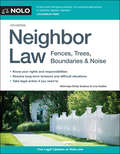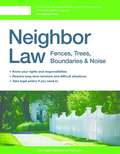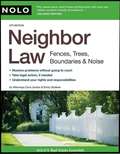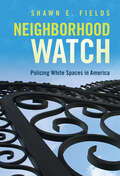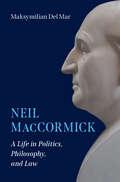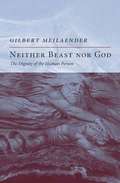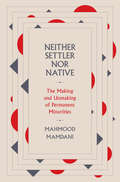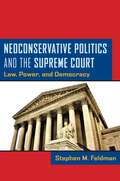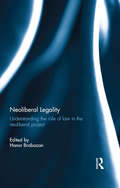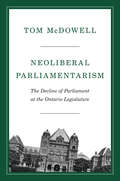- Table View
- List View
Negotiating With Insurance Companies
by Joseph VaccaroNegotiating With Insurance Companies Many plaintiffs' attorneys waste negotiating time by presenting information to adjusters in ways that do not resonate with them. Negotiating With Insurance Companies will teach you how to increase the size of your clients' settlements by using language, arguments and evidence that move adjusters and claims personnel. Packed with proven, practical advice culled from author Joseph L. Vaccaro's 40 years of insurance claims handling experience, this book brings you an insider's perspective on how to establish coverage, how to influence the carrier's reserves on your claim, and how to gain a tactical advantage in negotiations, mediation and litigation. Discover strategies for handling issues related to: * Personal auto claims * Commercial auto/truck claims * General liability claims * Big damages, bad liability cases * Own occupation disability income claims * Non-ERISA health insurance claims * Homeowners and commercial property losses * Bad faith
Negotiating in Civil Conflict: Constitutional Construction and Imperfect Bargaining in Iraq
by Haider Ala HamoudiIn 2005, Iraq drafted its first constitution and held the country’s first democratic election in more than fifty years. Even under ideal conditions, drafting a constitution can be a prolonged process marked by contentious debate, and conditions in Iraq are far from ideal: Iraq has long been racked by ethnic and sectarian conflict, which intensified following the American invasion and continues today. This severe division, which often erupted into violence, would not seem to bode well for the fate of democracy. So how is it that Iraq was able to surmount its sectarianism to draft a constitution that speaks to the conflicting and largely incompatible ideological view of the Sunnis, Shi’ah, and Kurds? Haider Ala Hamoudi served in 2009 as an adviser to Iraq’s Constitutional Review Committee, and he argues here that the terms of the Iraqi Constitution are sufficiently capacious to be interpreted in a variety of ways, allowing it to appeal to the country’s three main sects despite their deep disagreements. While some say that this ambiguity avoids the challenging compromises that ultimately must be made if the state is to survive, Hamoudi maintains that to force these compromises on issues of central importance to ethnic and sectarian identity would almost certainly result in the imposition of one group’s views on the others. Drawing on the original negotiating documents, he shows that this feature of the Constitution was not an act of evasion, as is sometimes thought, but a mark of its drafters’ awareness in recognizing the need to permit the groups the time necessary to develop their own methods of working with one another over time.
Negotiating in Civil Conflict: Constitutional Construction and Imperfect Bargaining in Iraq
by Haider Ala HamoudiIn 2005, Iraq drafted its first constitution and held the country’s first democratic election in more than fifty years. Even under ideal conditions, drafting a constitution can be a prolonged process marked by contentious debate, and conditions in Iraq are far from ideal: Iraq has long been racked by ethnic and sectarian conflict, which intensified following the American invasion and continues today. This severe division, which often erupted into violence, would not seem to bode well for the fate of democracy. So how is it that Iraq was able to surmount its sectarianism to draft a constitution that speaks to the conflicting and largely incompatible ideological view of the Sunnis, Shi’ah, and Kurds? Haider Ala Hamoudi served in 2009 as an adviser to Iraq’s Constitutional Review Committee, and he argues here that the terms of the Iraqi Constitution are sufficiently capacious to be interpreted in a variety of ways, allowing it to appeal to the country’s three main sects despite their deep disagreements. While some say that this ambiguity avoids the challenging compromises that ultimately must be made if the state is to survive, Hamoudi maintains that to force these compromises on issues of central importance to ethnic and sectarian identity would almost certainly result in the imposition of one group’s views on the others. Drawing on the original negotiating documents, he shows that this feature of the Constitution was not an act of evasion, as is sometimes thought, but a mark of its drafters’ awareness in recognizing the need to permit the groups the time necessary to develop their own methods of working with one another over time.
Negotiating the Deal
by Christopher AlcantaraThis book provides the first systematic and comprehensive analysis of the factors that explain both completed and incomplete treaty negotiations between Aboriginal groups and the federal, provincial, and territorial governments of Canada. Since 1973, groups that have never signed treaties with the Crown have been invited to negotiate what the government calls "comprehensive land claims agreements," otherwise known as modern treaties, which formally transfer jurisdiction, ownership, and title over selected lands to Aboriginal signatories. Despite their importance, not all groups have completed such agreements - a situation that is problematic not only for governments but for Aboriginal groups interested in rebuilding their communities and economies.Using in-depth interviews with Indigenous, federal, provincial, and territorial officials, Christopher Alcantara compares the experiences of four Aboriginal groups: the Kwanlin Dün First Nation (with a completed treaty) and the Kaska Nations (with incomplete negotiations) in Yukon Territory, and the Inuit (completed) and Innu (incomplete) in Newfoundland and Labrador. Based on the experiences of these groups, Alcantara argues that scholars and policymakers need to pay greater attention to the institutional framework governing treaty negotiations and, most importantly, to the active role that Aboriginal groups play in these processes.
Negotiating with Giants: Get what you want against the odds
by Peter D. JohnstonHOW DO YOU NEGOTIATE with Wal-Mart? With America's President over going to war? A pay raise from an intimidating boss? More money for a struggling start-up? Sweeping social change? Your survival if you're taken hostage by an armed killer? In this award-winning bestseller, you will travel across time through riveting, real-life David & Goliath stories uncovering the secrets and strategies of successful smaller players so you, too, can get what you want against the odds.
Negotiation (Routledge Revivals)
by Diana TribeFirst published in 1993, Negotiation places recent theoretical work on legal negotiation in a practical context. Negotiation skills are essential to every lawyer. Dealing chapter by chapter with planning for negotiation, verbal and non-verbal skills for the negotiator and the stages of a typical negotiation, the reader is invited to practice negotiation through an analysis of a real life negotiation transcript and a variety of case studies of increasing complexity. This is an important book for students of legal studies.
Negotiation Analysis: The Science and Art of Collaborative Decision Making
by Howard RaiffaThis masterly book substantially extends Howard Raiffa’s earlier classic, The Art and Science of Negotiation. It does so by incorporating three additional supporting strands of inquiry: individual decision analysis, judgmental decision making, and game theory. Each strand is introduced and used in analyzing negotiations. The book starts by considering how analytically minded parties can generate joint gains and distribute them equitably by negotiating with full, open, truthful exchanges. The book then examines models that disengage step by step from that ideal. It also shows how a neutral outsider (intervenor) can help all negotiators by providing joint, neutral analysis of their problem. Although analytical in its approach—building from simple hypothetical examples—the book can be understood by those with only a high school background in mathematics. It therefore will have a broad relevance for both the theory and practice of negotiation analysis as it is applied to disputes that range from those between family members, business partners, and business competitors to those involving labor and management, environmentalists and developers, and nations.
Negotiation Dynamics of the WTO: An Insider's Account
by Mohan KumarThe book aims at informing and educating the public at large about the intricacies of the Negotiation Dynamics at the WTO. It traces the period from the launch of the Uruguay Round in 1986 to its conclusion at Marrakesh in 1994 and the subsequent entry into force of the WTO on 1 January 1995.The book shows how WTO Ministerial Conference in Seattle was doomed to fail and its failure led to “trust deficit” between the developed countries on the one hand and certain key developing and least-developed countries on the other. Thus tracing the WTO saga that began in the wake of the failure at Seattle and the difficult path that led to the launch of a new Round at Doha in November 2001.The book throws light on India’s domestic decision-making structure as well as some of the factors driving India’s negotiating stance at the WTO. It also describes the current impasse at the WTO and offers some ideas to revive an institution that is so crucial for the smooth functioning of the multilateral trading system.
Negotiation and Lawyers (Career Guides)
by Art Hinshaw Alyson Carrel Leonard Riskin Chris Guthrie Richard Reuben Jennifer Robbennolt Nancy A. WelshNegotiation and Lawyers takes the latest scholarly thinking in negotiation and applies it to the various tasks that negotiators do in a way that negotiation practitioners will appreciate. <p><p>Written in 2020, the book is responsive to the increased role technology plays in the negotiation process due to the recent pandemic and provides important insights into the impact of racial inequity and implicit bias in negotiation. <p><p> Negotiation and Lawyers presents the core concepts, skills, and strategies for lawyers to succeed in the art of negotiation. We believe that anyone can improve their negotiating skills by utilizing research and psychology to inform a more intentional and strategic approach, which is what this book does―tailors negotiation theory to negotiation practice. <p><p>To do this, the authors move away from the prevailing method of teaching negotiation styles; they present negotiation as a process where two fundamental tasks are taking place: the creation and claiming of value. <p><p>Negotiators tend to think one task is more important than the other, and this book supports both schools of thought. No matter where one stands on this issue, improving one's ability as a negotiator requires practice in skills such as listening, framing, and perspective-taking as well as understanding how to effectively prepare for negotiation in order to make more strategic, intentional, and ethical decisions. <p><p>Furthermore, negotiators must acknowledge the impact of human factors in the process―emotions, cognitive biases, identity, perceptions, racial inequity, and implicit bias along with the non-human factors such as how to negotiate using various modes of technology. <p><p> This book presents these topics in a succinct manner and is ideal for 2-3 credit courses or shorter, intensive programs including negotiation training programs. At just under 200 pages, readers can easily absorb the core concepts while also having plenty of opportunity for deeper exploration through unique call-out boxes interspersed throughout the text as well as the traditional reflection questions in most textbooks.
Negotiation and Resistance: Peasant Agency in High Medieval France
by Constance Brittain BouchardIn Negotiation and Resistance, Constance Brittain Bouchard challenges familiar depictions of the peasantry as an undifferentiated mass of impoverished and powerless workers. Peasants in eleventh- and twelfth-century France had far more scope for action, self-determination, and resistance to oppressive treatment—that is, for agency—than they are usually credited with having. Through innovative readings of documents collected in medieval cartularies, Bouchard finds that while peasants lived hard, impoverished lives, they were able to negotiate, individually or collectively, to better their position, present cases in court, and make their own decisions about such fundamental issues as inheritance or choice of marriage partner. Negotiation and Resistance upends the received view of this period in French history as one in which lords dealt harshly and without opposition toward subservient peasants, offering numerous examples of peasants standing up for themselves.
Negotiations in the Case Law of the International Court of Justice: A Functional Analysis
by Karel WellensThis book examines the multifunctional role negotiations play in the jurisprudence of the International Court of Justice. Prior negotiations may be necessary to bring to the surface and clarify the legal aspects of a dispute before its submission to the ICJ. Negotiations may play a potential and parallel role during the course of the proceedings; results of negotiations may find their way into the judicial reasoning and may even form part of the basis of the judicial settlement. The Court’s judgment may require further negotiations for its implementation. A failure of this process may bring the parties back before the Court. This volume presents a detailed and critical examination of the case law of the ICJ through the prism of the functional interaction between negotiation and judicial settlement of disputes. In cases where legal interests of third States are involved this functional interaction becomes even more complex. The focus is not on the merits of each individual case, but on the Court’s contribution and clarification of this functional interplay. The systematic analysis of the Court’s jurisprudence makes this book essential reading for those involved with and studying international law and justice.
Neighbor Law
by Emily Doskow Lina GuillenAn easy-to-read guide on laws concerning common neighbor disputes Is the noise from next door keeping you up at night? Is the view from your backyard being obstructed? Is a neighboring business driving you crazy? Your home is important to you and your neighbors aren't going anywhere -- Neighbor Law can help you deal with difficult situations and keep your home life peaceful. Learn your rights and responsibilities with this clear-cut, comprehensive guide to the laws concerning common neighbor disputes. Learn your state's rules on: - fences - trees and other greenery that crosses the property line - boundaries - blocked views - noise - water runoff and flooding - interference from nearby businesses - dangers to children ("attractive nuisances") - ...and more! In plain English, Neighbor Law explains how to find applicable laws and resolve disputes without going to court, whenever possible. And, if you must go to small claims court, you'll find all the information and strategies you need. This edition is completely revised and provides new sample letters for engaging a neighbor over a dispute, and includes expanded information on mediation and dispute resolution. Plus, read new material on how to build community and prevent disputes.
Neighbor Law: Fences, Trees, Boundaries & Noise
by Emily Doskow Lina GuillenResolve neighbor conflicts and get peace of mind Don’t let a neighborly nuisance turn into a nasty lawsuit. Learn your rights and responsibilities with Neighbor Law, the plain-English guide to the laws behind common neighbor disputes. Neighbor Law is more than a legal guide—it’s a practical book filled with tips on how to solve problems and restore good neighbor relations. Find out how to handle: noisy neighbors trees that hang over a property line blocked views unclear boundary lines high, unsightly, or deteriorating fences dangers to children (“attractive nuisances”) problems with neighboring businesses drones trespassing onto your property other common issues, like secondhand smoke, blighted property, and animal issues. The 10th edition includes updated laws and information on going to court, boundary fences, private nuisances, and much more.
Neighbor Law: Fences, Trees, Boundaries & Noise
by Emily Doskow Attorney Lina Guillen AttorneyIs the noise from next door keeping you up at night? Is the view from your backyard being obstructed? Is a neighborhood business driving you crazy? Learn your rights and responsibilities with Neighbor Law, Nolo's clear-cut, comprehensive guide to the laws concerning common neighbor disputes. This popular bestseller covers: fences trees animal issues boundaries blocked views noise water issues neighborhood businesses dangers to children ("attractive nuisances") secondhand smoke and other pollutants, and drones. In plain English, Neighbor Law explains how to find applicable laws and resolve disputes without going to court. It tells you when the law is on your side and how to deal with your neighbors without creating enemies. If you must go to small claims court, you will also find all the facts you need here.
Neighbor Law: Fences, Trees, Boundaries and Noise (6th edition)
by Emily Doskow Cora JordanAn easy-to-read guide to laws concerning common neighbor disputes, including noise, trees and blocked views.
Neighborhood Watch: Policing White Spaces in America
by Shawn E. FieldsAlthough racism has plagued the American justice system since the nation's colonial beginnings, private White Americans are taking matters into their own hands. From racist 911 calls and hoaxes to grassroots voter suppression and vigilante 'self-defense,' concerted efforts are made every day by private citizens to exclude Black Americans from schools, neighborhoods, and positions of power. Neighborhood Watch examines the specific ways people police America's color line to protect 'White spaces.' The book charts how these actions too often result in harassment, arrest, injury, or death, yet typically go unchecked. Instead, these actions are promoted and encouraged by legislatures looking to expand racially discriminatory laws, a police system designed to respond with force to any frivolous report of Black 'mischief,' and a Supreme Court that has abdicated its role in rejecting police abuse. To combat these realities, Neighborhood Watch offers preliminary recommendations for reform, including changes to the 'maximum policing' state, increased accountability for civilians who abuse emergency response systems, and proposals to demilitarize the color line.
Neighbors In Need: Zimbabweans Seeking Refuge in South Africa
by Human Rights WatchThis 119-page report examines South Africa's decision to treat Zimbabweans merely as voluntary economic migrants and its failure to respond effectively to stop the human rights abuses and economic deprivation in Zimbabwe that cause their flight and to address their needs in South Africa. Human Rights Watch spoke to almost 100 Zimbabweans in South Africa about their plight.
Neil Cockett on Bunkers (Lloyd's Practical Shipping Guides)
by Neil CockettBunkers are the lifeblood of the shipping industry - their availability, quality and, above all else, cost often determine whether a shipowner can operate efficiently and profitably. Cockett on Bunkers provides those involved in the shipping and oil industries with an understanding of the worldwide bunker fuel industry and a comprehensive manual that can be used as a reference in day-to-day bunker management and operation. Cockett on Bunkers contains up-to-date information on marine fuel standards and monitoring services, bunker buying techniques, bunker suppliers and the art of blending, pricing and bunkering operational procedures and takes into account recent developments in these areas.;Written in an accessible style with the emphasis on practical interpretation.
Neil MacCormick: A Life in Politics, Philosophy, and Law
by Maksymilian Del MarNeil MacCormick (1941–2009) was one of the twentieth century's most important legal philosophers and one of Scotland's most influential public intellectuals. This book tells the story of his political and philosophical life, from his intensely political childhood as the son of 'King John', one of the founders of the Scottish National Party, through to his involvement in Scottish politics – especially as the author of SNP's constitutional policy – and his role as a Member of the European Parliament, helping to draft the European Constitution. With special attention to MacCormick's character, this book offers a reading of his entire oeuvre, covering his contributions to theories of legal and moral reasoning, institutional legal theory, nationalism, post-sovereignty, subsidiarity, and constitutional pluralism in Europe. This book reads MacCormick as a highly creative thinker who excelled in the art of constructing inclusive middles and thereby developed his own distinctive approach to politics and philosophy.
Neither Beast Nor God
by Gilbert MeilaenderAppeals to "human dignity" are at the core of many of the most contentious social and political issues of our time. But these appeals suggest different and at times even contradictory ways of understanding the term. Is dignity something we all share equally, and therefore the reason we all ought to be treated as equals? Or is it what distinguishes some greater and more admirable human beings from the rest? What notion of human dignity should inform our private judgments and our public life?In Neither Beast Nor God, Gilbert Meilaender elaborates the philosophical, social, theological, and political implications of the question of dignity, and suggests a path through the thicket. Meilaender, a noted theologian and a prominent voice in America's bioethics debates, traces the ways in which notions of dignity shape societies, families, and individual lives, and incisively cuts through some common confusions that cloud our thinking on key moral and ethical questions. The dignity of humanity and the dignity of the person, he argues, are distinct but deeply connected--and only by grasping them both can we find our way to a meaningful understanding of the human condition.
Neither Man Nor Beast: Feminism and the Defense of Animals
by Carol J. AdamsThis book explores the common link between cultural attitudes to women and animals in modern Western culture that have enabled the systematic exploitation of both. A vivid work that takes in environmental ethics, theological perspectives and feminist theory, the Bloomsbury Revelations edition.
Neither Settler nor Native: The Making And Unmaking Of Permanent Minorities
by Mahmood MamdaniMaking the radical argument that the nation-state was born of colonialism, this book calls us to rethink political violence and reimagine political community beyond majorities and minorities.In this genealogy of political modernity, Mahmood Mamdani argues that the nation-state and the colonial state created each other. In case after case around the globe—from the New World to South Africa, Israel to Germany to Sudan—the colonial state and the nation-state have been mutually constructed through the politicization of a religious or ethnic majority at the expense of an equally manufactured minority.The model emerged in North America, where genocide and internment on reservations created both a permanent native underclass and the physical and ideological spaces in which new immigrant identities crystallized as a settler nation. In Europe, this template would be used by the Nazis to address the Jewish Question, and after the fall of the Third Reich, by the Allies to redraw the boundaries of Eastern Europe’s nation-states, cleansing them of their minorities. After Nuremberg the template was used to preserve the idea of the Jews as a separate nation. By establishing Israel through the minoritization of Palestinian Arabs, Zionist settlers followed the North American example. The result has been another cycle of violence.Neither Settler nor Native offers a vision for arresting this historical process. Mamdani rejects the “criminal” solution attempted at Nuremberg, which held individual perpetrators responsible without questioning Nazism as a political project and thus the violence of the nation-state itself. Instead, political violence demands political solutions: not criminal justice for perpetrators but a rethinking of the political community for all survivors—victims, perpetrators, bystanders, beneficiaries—based on common residence and the commitment to build a common future without the permanent political identities of settler and native. Mamdani points to the anti-apartheid struggle in South Africa as an unfinished project, seeking a state without a nation.
Neoconservative Politics and the Supreme Court: Law, Power, and Democracy
by Stephen M. FeldmanIn this concise, timely book, constitutional law expert Stephen M. Feldman draws on neoconservative writings to explore the rise of the neocons and their influence on the Supreme Court. Neocons burst onto the political scene in the early 1980s via their assault on pluralist democracy’s ethical relativism, where no pre-existing or higher principles limit the agendas of interest groups. Instead, they advocated for a resurrection of republican democracy, which declares that virtuous citizens and officials pursue the common good. Yet despite their original goals, neocons quickly became an interest group themselves, competing successfully within the pluralist democratic arena. When the political winds shifted in 2008, however, neocons found themselves shorn of power in Congress and the executive branch. But portentously, theystill controlled the Supreme Court. Neoconservative Politics and the Supreme Court explains how and why the neoconservatives criticized but operated within pluralist democracy, and, most important, what the entrenchment of neocons on the Supreme Court means for present and future politics and law.
Neoliberal Legality: Understanding the Role of Law in the Neoliberal Project
by Honor BrabazonNeoliberalism has been studied as a political ideology, an historical moment, an economic programme, an institutional model, and a totalising political project. Yet the role of law in the neoliberal story has been relatively neglected, and the idea of neoliberalism as a juridical project has yet to be considered. That is: neoliberal law and its interrelations with neoliberal politics and economics has remained almost entirely neglected as a subject of research and debate. This book provides a systematic attempt to develop a holistic and coherent understanding of the relationship between law and neoliberalism. It does not, however, examine law and neoliberalism as fixed entities or as philosophical categories. And neither is its objective to uncover or devise a ‘law of neoliberalism’. Instead, it uses empirical evidence to explore and theorise the relationship between law and neoliberalism as dynamic and complex social phenomena. Developing a nuanced concept of ‘neoliberal legality’, neoliberalism, it is argued here, is as much a juridical project as a political and economic one. And it is only in understanding the juridical thrust of neoliberalism that we can hope to fully comprehend the specificities, and continuities, of the neoliberal period as a whole.
Neoliberal Parliamentarism: The Decline of Parliament at the Ontario Legislature
by Tom McDowellIn Neoliberal Parliamentarism, Tom McDowell provides an alternative approach to understanding the decline of parliament at the Ontario legislature, an approach that highlights the politics of neoliberalism and the significant impact it has had over the last four decades. McDowell offers a structural critique of parliament, claiming that restrictions on the legislature cannot be separated from the ascendance of neoliberalism as the dominant social and policy paradigm in the province. Tracking the evolution of procedure at the Ontario Legislature from 1981 to 2021, McDowell shows that, beginning in the early 1980s, the establishment of increasingly restrictive procedural rules was critical in securing the passage of controversial neoliberal restructuring policies. Further, he argues that the decades-long shift towards de-democratization and the concentration of political power in the executive ought to be understood in the context of neoliberalism’s rejection of parliamentary sovereignty and legal positivism. As an in-depth study of the implementation of neoliberalism policy on the political apparatus of Ontario, Neoliberal Parliamentarism is critical reading for scholars and students interested in the relationship between neoliberalism and de-democratization, the politics of Ontario, and parliamentary procedure more broadly.

